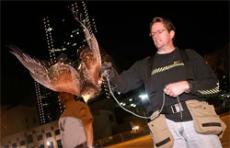They haunt from the trees. They swoop through the air. They leave their mark on clean cars. And they are more than some students can bear.They sport iridescent feathers and gawking yellow eyes. They can be more than a foot long. And above TCU’s campus, they flood the skies.
They are birds. Big black birds. Grackles. And according to one TCU student, “Those birds are evil.”
Students and Fort Worth residents are complaining about their excessive stay in town, and according to officials, their population just won’t go down.
But they’re protected by the Migratory Bird Treaty Act, which makes killing the birds illegal.
So what can TCU do to control the grackle problem?
“Somebody said something about some guy driving around blaring loud things,” said Aaron Giombolini, a junior radio-TV-film major. “I mean come on, can that really be true?”
True it is. And one physical plant director said it’s not only true, but also a proven method.
“We’ve taken two-by-fours and clapped them together to scare them out of the trees,” said Robert Sulak, director of landscaping and grounds. “That worked OK but wasn’t all that easy to do, considering we had the whole campus to cover. We found that a horn works the best.”
Sulak said the system is effective but simple.
“We’ve got an employee that stays after work and drives around campus in a little scooter with a horn on it to scare them out from roosting in the trees,” Sulak said. “So far, it seems to work. It’s a little inconvenient and annoying for the people around the horn, but it’s better than having the droppings on your car or the sidewalk.”
Still, some students think the efforts to scare off their feathered foes are not taken far enough.
“I think they should be killed,” said Curtis Shideler, a senior RTVF major. “Their population definitely needs to be decreased.”
Shideler said the birds are not only pesky, but also scary, too.
“It’s like watching the movie, ‘The Birds,’ but being in it,” Shideler said. “I kid you not. During the summer, when I worked on campus and walked the same path every day, they would swoop down at my head because they’re so territorial. I don’t want to sound weird, but I would carry something in my hand so I could hit them when they tried to attack me. I almost got one once.”
Another student agreed with Shideler.
“They seriously lead me to want to be inhumane,” said Megan Fischer, a junior RTVF major. “I’m not fond of the grackles. I wish there was a way they could be humanely decreased.”
Sulak said the grackle population wasn’t unbearable until about two years ago.
For now, Sulak said, the air horn seems to work. But if the problem gets worse, he said, TCU will take more extensive measures.
“In Fort Worth, they’ve fired blank shotgun shells and a lot of other techniques,” Sulak said. “If they get worse on campus, we’ll have to send someone off to get certified to do other techniques like that.

